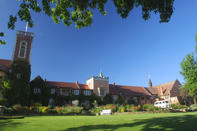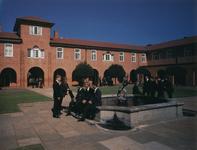Increased Academic Standards
Clement Yorke Morgan arrived at Michaelhouse in 1953. Within months of his arrival he had increased class time in order to try to improve the academic standards of the school.

The results were immediate: in 1954 R. Schmidt won the Queen Victoria Memorial Prize for the best English essay and in 1955 G.R. Ellis won a prize for the best science paper in the country.
One of the most important achievements of Morgan's tenure was the setting up of the Michaelhouse Trust in 1957, which put the school on a sound financial footing and assured its continued prosperity. Clem Morgan did not live to see the fruits of his labour, dying suddenly of a heart attack in 1960.
The Introduction of 'Toyes'
The man who stepped into Clem Morgan’s shoes was Robert 'Tommy' Norwood, a man who had been on the staff of Michaelhouse since 1949. He adopted the policy of staffing the school 'mainly by men who were South Africans by birth or by choice'. Norwood's aim was to produce boys who were 'robust physically, mentally, morally and spiritually' and he immediately began working to this end.
He was the man behind the erection of the new gym and the rebuilding of the black staff quarters. He was also instrumental in the updating of the school equipment and teaching aids, and was the moving force behind the introduction of 'toyes', small cubicles offering each boy a degree of privacy in which to study.
His pupils' results vindicated his efforts: in 1966 B Draper and A Graham reached the final 10 in the countrywide maths olympiad, and the following year three Michaelhouse boys made it through to the final 10. This set a pattern that was not to be broken and since its inception Michaelhouse has had more pupils go through to the finals of the maths olympiad than any other school.
The enthusiasm with which the boys threw themselves into every aspect of school life was reflected in the wide range of well-supported extracurricular activities, from the debating club to the venture club, from cadets to the pen club. There were 43 clubs and societies in operation at the school in 1963.
Opening of a Music School
Norwood resigned in 1968 and Rhodes Scholar Rex Frampton Pennington took his place as rector of Michaelhouse the following year, becoming the first Old Boy to hold the position.
By the end of Pennington's first year, a long-needed gap in the accommodation of Michaelhouse had been filled, and Cottage Avenue was lined with staff houses.
Further building improvements included the rebuilding of the school kitchens and the opening of a music school and an audiovisual centre. The Schlesinger Theatre, the gift of Old Boy John Schlesinger, was opened in 1976. Rex Pennington saw the school through its 75th anniversary and left in 1977.
Cultured Man
Neil Jardine, a man described by Anson Lloyd (then chairman of the board of governors of the school) as a 'cultured rugger-bugger', took Pennington’s place. By 1981, in spite of the critical teacher-shortage that had hit the country, enrolment at the school had reached an all-time high of 460 boys.
Jardine was also responsible for the continued interest of the boys in societies, especially the theatrical side of the school and made his special project the development of the 'exceptionally able pupil' (School magazine). At the end of 1986 Jardine resigned, after serving the school for nine years, to take up the headmaster's chair at Kingswood College in Grahamstown.
Proud Tradition Continues

Rector Greg Theron resigned at the end of 2017 with deputy Paul Fleischack taking over as interim rector. Admission of all races is today a given at Michaelhouse - unlike in the year 1946, when rector Snell processed an application in the usual way and admitted a Chinese boy to school, a move that resulted in the resignation of one of the governors of the board and a subsequent instruction from the board that in the future such matters should be referred to it.
Michaelhouse is a school with a proud tradition and ethos that arose out of the fertile plains of the Natal Midlands.